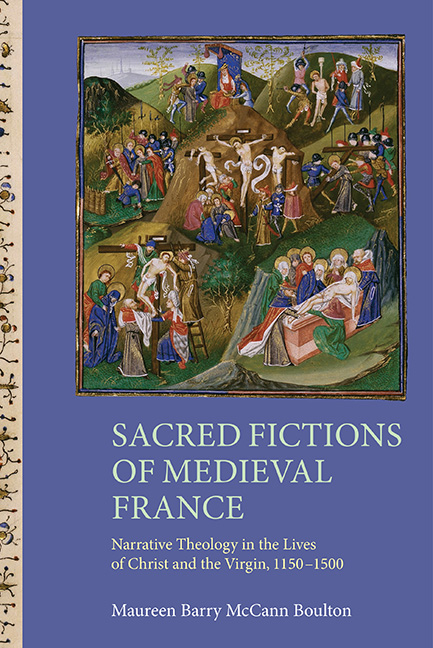 Sacred Fictions of Medieval France
Sacred Fictions of Medieval France Book contents
- Frontmatter
- Dedication
- Contents
- Acknowledgements
- Abbreviations
- Introduction
- 1 Sacred Romances: Genealogy, Lineage and Cyclicity
- 2 Sacred Epic and the Diffusion of Anti-Jewish Sentiment
- 3 Sacred Allegory and Meditation
- 4 Sacred Histories: the Chronicles of Jean d’Outremeuse and Jean Mansel
- 5 Sacred Imaginations: Lives of Christ and the Virgin in Texts of A ffective Devotion
- Epilogue: Lives and Afterlives
- Appendix: Lists of Manuscripts by Chapter
- Bibliography
- Index
Introduction
Published online by Cambridge University Press: 11 June 2021
- Frontmatter
- Dedication
- Contents
- Acknowledgements
- Abbreviations
- Introduction
- 1 Sacred Romances: Genealogy, Lineage and Cyclicity
- 2 Sacred Epic and the Diffusion of Anti-Jewish Sentiment
- 3 Sacred Allegory and Meditation
- 4 Sacred Histories: the Chronicles of Jean d’Outremeuse and Jean Mansel
- 5 Sacred Imaginations: Lives of Christ and the Virgin in Texts of A ffective Devotion
- Epilogue: Lives and Afterlives
- Appendix: Lists of Manuscripts by Chapter
- Bibliography
- Index
Summary
This book presents a general (and preliminary) survey of the many texts which retell the lives of Christ and his mother in various French vernaculars (Anglo-Norman and Old Occitan, as well as Old and Middle French) between the middle of the twelfth century and the second half of the fifteenth century. These texts vary greatly in narrative form (epic, romance, allegory, chronicle, and meditation) and were written both in verse (in the twelfth and thirteenth centuries) and in prose (in the fourteenth and fifteenth). Their popularity with medieval readers may be estimated both from the large number of different texts preserved and from the rich and complex tradition of the manuscripts that preserve them, often in dozens of copies produced over two centuries. The sheer number of works (more than a hundred) has obliged me to concentrate my attention in this book on a selection, choosing several from each generic type over the whole period in which such works were composed.
Literature and religion, religious literature: recent studies
Like other works reflective of lay piety in my period, lives of Christ and the Virgin were long overlooked by modern literary scholars, partly out of ignorance of their existence, and partly out of a general lack of interest in religion. Nevertheless, a number of scholars have begun to redress this gap. Nearly fifteen years ago, noting the ‘interplay between devotional literature and texts that we think of as profane’, Simon Gaunt posed the question ‘Is anything “purely secular” in the Middle Ages?’ His study of Bernart de Ventadorn's treatment of themes of self-sacrifice and martyrdom heralded more recent studies of what Barbara Newman terms ‘crossovers’ or ‘the intentional borrowing and adaptation of courtly themes in devotional art and vice-versa’. Since then, both of these authors have developed their initial insights into monographs. In 2006, Dorothea Kullmann organized a workshop to examine the relationship between the Church and the rise of vernacular literature in France. She argued in the resulting volume of essays that the tension between lay and ecclesiastical concerns fostered innovation and experimentation.
These welcome studies of the points of contact between religious and secular literature have been accompanied by a renewal of interest in religious literature per se. Hagiography was perhaps the first genre to receive this attention.
- Type
- Chapter
- Information
- Sacred Fictions of Medieval FranceNarrative Theology in the Lives of Christ and the Virgin, 1150–1500, pp. 1 - 20Publisher: Boydell & BrewerPrint publication year: 2015


